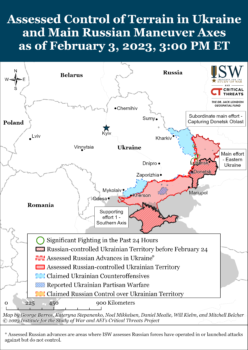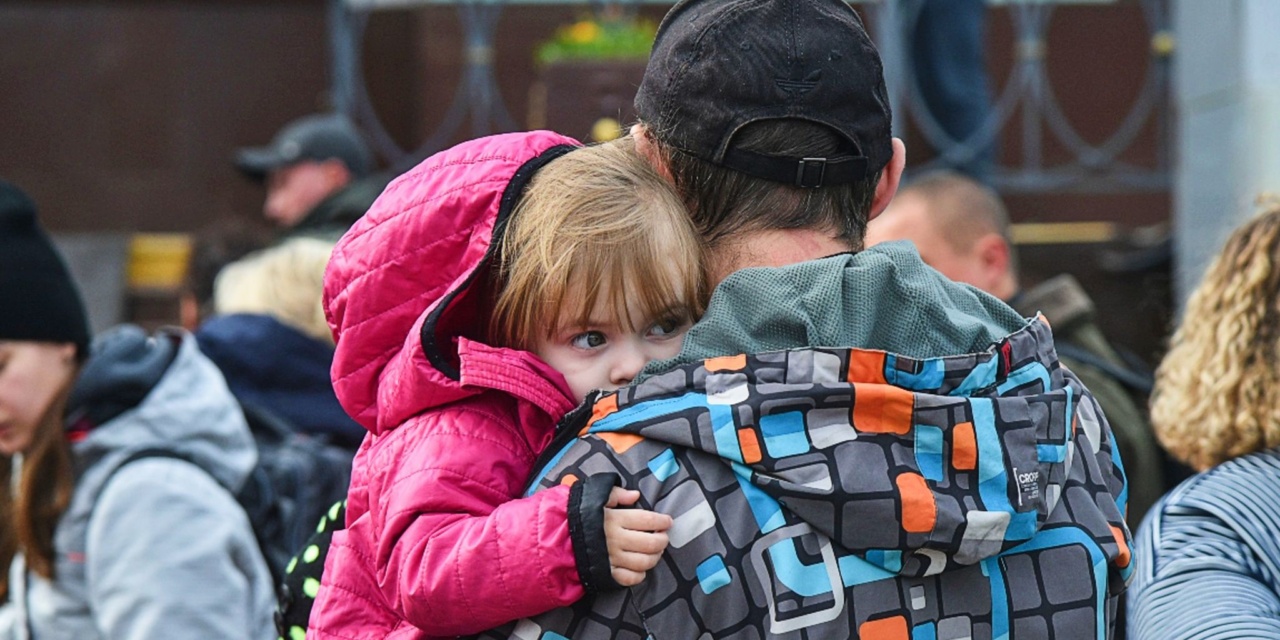A Ukrainian child moved from the Kherson region to Crimea, October 2022 (EPA-EFE/Rex/Shutterstock)
Monday’s Coverage: Defense Minister Reznikov to be Replaced — Reports

Source: Institute for the Study of War
UPDATE 1858 GMT:
Amid reports that Berlin has approved delivery of 178 Leopard 1s to Ukraine (see below), a joint statement by Germany, Denmark, and the Netherlands says they will provide at least 100 refurbished Leopard 1s.
The Defense Ministers of the three countries said the supply is part of an effort “to support Ukraine in their endeavor to withstand Russian aggression” and “significantly enhance Ukraine’s military potential for the restoration of their violated territorial integrity”.
UPDATE 1745 GMT:
Reports are circulating that Germany’s Scholz Government has approved the delivery of 178 Leopard 1 battle tanks to Ukraine.
Last month Berlin committed to only 14 Leopard 2s, with others coming from a coalition of European countries and Canada.
German Defense Minister Boris Pistorius made an unannounced visit to Kyiv on Tuesday as Berlin confirmed that it will send additional Leopard 2s.
The Defense Ministry said Leopard 2A6 battle tanks will be available in Ukraine by the end of March.
But Ukraine Defense Minister Oleksiy Reznikov, posting a photo of himself and Pistorius, announced the arrival of the first Leopard 2 — a toy model of the tank.
BREAKING: The «first» Leopard 2 has arrived in Kyiv 🐆
There will be more of them.✊
Thank you to @Bundeskanzler my colleague Boris Pistorius and the German people.
The tank coalition is marching… to victory! pic.twitter.com/4VY2YaovBi— Oleksii Reznikov (@oleksiireznikov) February 7, 2023
Earlier, the head of the German armsmaker Rheinmetall said it expects to send 20 to 25 Leopard 1s to Ukraine this year. CEO Armin Papperger told a conference, “The rest of the 88 that we have will be delivered next year.”
UPDATE 1357 GMT:
Ukraine officials have released video footage of Russia’s Wagner Group mercenaries dragging their badly wounded commander away from the battlefield and then beating him.
The footage is from an Ukrainian drone over the frontline near the city of Bakhmut in eastern Ukraine.
UPDATE 1007 GMT:
Ukraine’s Parliament has confirmed Ihor Klymenko as Interior Minister.
The former head of the National Police of Ukraine, Klymenko has been the acting Interior Minister since his predecessor Denys Monastyrsky and other senior officials were killed in a helicopter crash near Kyiv on January 18.
Parliament also confirmed Vasyl Maliuk, who has been the acting head of the SBU security service, as the permanent chief.
News is still awaited on whether Ukraine Defense Minister Oleksiy Reznikov will be transferred to another post.
Reznikov has been prominent in Kyiv’s campaign for military assistance from allies — last week he was in Paris meeting his French counter and President Emmanuel Macron.
However, amid the Zelenskiy Government’s anti-corruption drive, he was under increasing pressure because of the Defense Ministry’s overpayments for military rations.
On Sunday, David Arakhamia, the Parliamentary head of President Volodymyr Zelenskiy’s party, said Reznikov would become Strategic Industries Minister and would be replaced by Kyrylo Budanov, head of the GUR military intelligence agency.
Reznikov tweeted on Monday:
Holding the line.
Thank you all for your support, as well as constructive criticism. We draw conclusions.
We continue the reforms. Even during the war.
We are strengthening the defense and working for victory.
Glory to Ukraine!— Oleksii Reznikov (@oleksiireznikov) February 7, 2023
UPDATE 0811 GMT:
Despite warnings of a Russian troop build-up and imminent major offensive in eastern Ukraine, UK military intelligence assesses:
Russian forces have only managed to gain several hundred metres of territory per week. This is almost certainly because Russia now lacks the munitions and manoeuvre units required for successful offensives. Senior commanders likely make plans requiring undermanned, inexperienced units to achieve unrealistic objectives due to political and profession pressure.
The analysts conclude, “Russian leaders will likely continue to demand sweeping advances. It remains unlikely that Russia can build up the forces needed to substantially affect the outcome of the war within the coming weeks.”
ORIGINAL ENTRY: In a public display of Russia’s targeting of children for annexation of Ukrainian territory, “Commissioner on Children’s Rights” Maria Lvova-Belova met with Russian proxy officials on Monday.
Lvova-Belova praised the Crimean occupation administration for “accepting” children from other occupied areas, notably the Donetsk and Luhansk regions in eastern Ukraine and the Zaporizhia, and Kherson regions in the south. She said the “Day After Tomorrow” organization will begin “rehabilitation” tours in Crimea to help children who need “special psychological assistance”.
The occupation head in Sevastopol in Crimea, Mikhail Razvozhaev, said he met Lvova-Belova to discuss “new formats of social work”. Significantly, he commented that most of the children who require social support are not orphans.
The UN High Commissioner for Refugees, Filippo Grandi, said on January 26 that Russia is violating the “fundamental principles of child protection” in wartime. UN officials are unable to estimate the number of children put up for adoption or given passports because of Russian obstacles: “We are seeking access all the time, and access has been rather rare, sporadic and not unfettered, if you see what I mean.”
Ukraine’s Presidential advisor for children’s rights, Daria Herasymchuk, said last month that officials have confirmed the deportation of 13,899 children to Russia. Only 125 had been returned.
“Rehabilitation”
Russian proxy officials have used the pretext of psychiatric and medical rehabilitation to move children within occupation territory to deport them to Russia.
On January 3, Vladimir Putin directed Lvova-Belova and the occupation heads of administration to “take additional measures to identify minors…left without parental care” in occupied areas so they could be provided with “state social assistance” and “social support.”
According to the head of the “Luhansk People’s Republic”, Leonid Pasechnik, Lvova-Belova proposed Monday that children whose personal data has been collected will be “able to find a family in other regions of the Russian Federation”.
Lvova-Belova also met with “Donetsk People’s Republic” Head Denis Pushilin over programs “for the socialization of adolescents” and with Zaporizhzhia occupation head Yevgeny Balitsky about social institutions for children.
Russia occupied Crimea in 2014, weeks after a popular uprising toppled pro-Russian President Viktor Yanukovych from power, and sent in military forces to help proxies control parts of the Donetsk and Luhansk regions.
Last September 21, Putin declared the “annexation” of Donetsk and Luhansk and also Zaporizhzhia and Kherson, parts of which had been seized during the Russian invasion.
However, Ukraine pushed back in the south, liberating territory — including Kherson city — last autumn. Fighting is now concentrated in the east as Ukrainian officials warned of a renewed Russian offensive this month.

